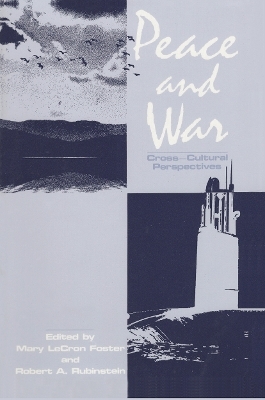
Peace and War
Routledge (Verlag)
978-1-138-52965-6 (ISBN)
Is war necessary? In Peace and War prominent anthropologists and other social scientists explore the cultural and social factors leading to war. They analyze the covert causes of war from a cross-cultural perspective: ideologies that dispose people to war; underlying patterns of social relationships that help institutionalize war; and the cultural systems of military establishments. Overt causes of war environmental factors like the control of scarce resources, advantageous territories, and technologies, or promoting the wel-fare of people "like" oneself are also considered.
The authors examine anthropologists' role in policy formation how their theories on the nature of culture and society help those who deal with global problems on a day-to-day basis. They argue that both covert and overt mechanisms are pushing the world closer to a devastating war and offer strategies to weaken the effects of these mechanisms. This anthropological and historical analysis of the causes of war is a valuable resource for those studying war and those trying to understand the place of social science in framing pacific options.
Mary LeCron Foster is research associate in the Department of Anthropology, University of California, Berkeley.
Acknowledgments
Preface
Introduction
Part I The Individual, Community, and Conflict
1. Personal Motivation and Institutionalized Conflict
2. The Uses of Fear: Porro Gangs in Mexico
3. Toward a Structural Model of Violence:
Male Initiation Rituals and Tribal Warfare
4. Fighting for Peace
5. The Culture of United States Military Enclaves
6. Is War Necessary?
7. The Cultural Patterning of Risk-Seeking Behavior:
Implications for Armed Conflict
Part II The Dynamics of Conflict
8. Land Disputes and the Gods in the Prehispanic Mixteca
9. Directed Change and the Hope for Peace
10. Ethnic Targeting as a Defense Strategy
11. Conflict in the Horn of Africa
12. Christianity and War
Part III Social Scientists React
13. Sociopsychological Aspects of the Prevention of Nuclear War
14. The Drift to War
15. The War-Making Institutions
16. The Nature of War and the American Military Profession
17. War and Peace: The View of a Soviet Scholar
Part IV Conflict and the Nation-State
18. Ideology and Institutions in Peace and War
19. War and War Proneness in Pre- and Postindustrial States
20. The Developmental Dynamics of Peace
21. The Anthropology of Global Integration:
Some Grounds for Optimism about World Peace
22. The Superpowers and the Tribes
Part V Anthropology and Policy
23. Anthropology for the Second Stage of the Nuclear Age
24. Anthropology as a Nonpolicy Science
25. Global Policy and Revolution in Social Sciences
26. Conflict and Belief in American Foreign Policy
27. The Collapse of Strategy: Understanding
Ideological Bias in Policy Decisions
Conclusion: Toward an Anthropology of Peace and War
About the Contributors
| Erscheinungsdatum | 15.09.2023 |
|---|---|
| Verlagsort | London |
| Sprache | englisch |
| Maße | 152 x 229 mm |
| Gewicht | 1020 g |
| Themenwelt | Sozialwissenschaften ► Politik / Verwaltung |
| ISBN-10 | 1-138-52965-6 / 1138529656 |
| ISBN-13 | 978-1-138-52965-6 / 9781138529656 |
| Zustand | Neuware |
| Informationen gemäß Produktsicherheitsverordnung (GPSR) | |
| Haben Sie eine Frage zum Produkt? |
aus dem Bereich


